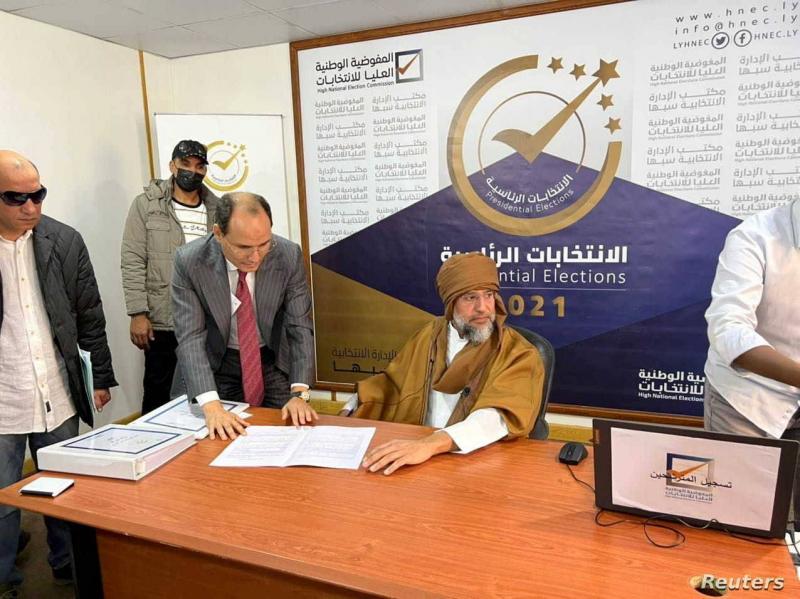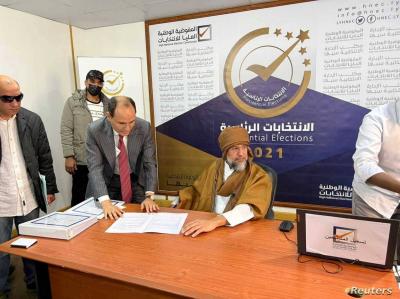Under the title "Qaddafi's Candidacy Could Upset the Libyan Elections… and Threaten Haftar's Chances," Al-Hurra reported the emergence of Saif al-Islam Qaddafi in an outfit similar to his father's, as he presented his candidacy papers for the presidential elections in Libya on Sunday. Observers see this move as a significant blow to the prospects of General Khalifa Haftar, the leader of the "Libyan National Army." Analysts believe that Qaddafi could attract many of Haftar's supporters, while documents indicate that Qaddafi boasted to Wagner Group members that 80% of Haftar's supporters would back him as a ruler, according to the British newspaper The Independent.
Ahmad al-Mahdawi, a political science professor at the British University in Benghazi, believes that 50% of Haftar's supporters came from Qaddafi's military brigades; however, their willingness to support Saif al-Islam again depends on each candidate’s electoral project. Al-Mahdawi stated in remarks to Al-Hurra that Qaddafi's candidacy would impact the overall electoral scene in Libya, noting that "the strength of Qaddafi and Haftar is equal," although the latter's advantage is owed to his success in fighting terrorism, while Qaddafi relies on the failures of the February Revolution.
Political analyst Muhammad al-Asmar mentioned that many of Haftar's supporters are from the "Green Movement," supporting Qaddafi's military operations and unification of the army but are likely to vote for Saif al-Islam. On Tuesday, Haftar submitted his candidacy papers for the presidential elections in Libya after a two-month suspension from military duties.
Political analyst Abdullah al-Kabir asserts that it is premature to discuss the candidates' chances in the elections, indicating that "ambiguity reigns supreme regarding the presidential elections; they may be canceled or postponed." Al-Kabir pointed out in an interview with Al-Hurra that "both are required to appear before the judiciary," adding that "Haftar holds American citizenship."
On Sunday, the military prosecutor's office in Libya requested the High National Elections Commission to halt any proceedings related to the candidacies of both Saif al-Islam Qaddafi and Khalifa Haftar for the Libyan presidency, due to their alleged involvement in war crimes, according to an Al-Hurra correspondent. The legal request came on the same day Saif al-Islam submitted his candidacy papers.
In November 2011, an armed group in the city of Zintan, southwest of Tripoli, captured Qaddafi, who was sentenced to death in a brief trial. However, the armed group refused to hand him over to the Tripoli authorities or the International Criminal Court, which accuses him of committing crimes against humanity during the revolution that ousted his father's regime in February 2011. A court in Tripoli sentenced Saif al-Islam to absentia death in 2015 on charges of committing war crimes, including killing protesters during the uprising. At that time, the International Criminal Court stated that the trial did not meet international standards. The ICC, based in The Hague, also seeks his arrest on charges of "crimes against humanity."
In this context, The New York Times noted after speaking with Qaddafi on July 30 that he "is convinced that these legal matters can be negotiated if a majority of the Libyan people choose him as their leader," indicating that "Saif apparently believes that he alone can represent a state for all Libyans." There are many doubts about the likelihood of elections occurring on schedule, due to the High State Council's rejection of electoral laws, with elections scheduled for December 24 in two rounds.
Virgini Kolombie, an expert on Libyan affairs at the European University Institute in Florence, told The Independent, "Even if Qaddafi is not allowed to run and elections are not held, his candidacy lends legitimacy to him as a political player and influencer in any future political settlement in Libya."
Russian Support
The British newspaper further reported that Saif al-Islam is receiving support from Russia, which is a primary backer of Khalifa Haftar. Tarek Megerisi, an expert on Libyan affairs at the European Council on Foreign Relations, stated that there are "clear relations between Russia and Saif al-Islam." Last year, documents obtained by Bloomberg revealed that Qaddafi met three times with Wagner agents, who assisted him in promoting himself as a political player in Libya on social media.
Al-Kabir remarked that Saif Qaddafi's candidacy is "a Russian response to the American insistence on holding elections, aimed at creating the necessary confusion and then completely derailing them." He added, "Saif is Russia's first choice, followed by Haftar. Russia relies on one of them to legitimize its armed presence in Libya," pointing out that Moscow prefers Qaddafi for two reasons: the previous strong relations with his father's regime and "lack of total trust in Haftar due to his previous ties with U.S. intelligence." However, al-Mahdawi dismissed the idea of Russian contact with Qaddafi, attributing this to Haftar's control over the ground rather than Qaddafi.
Other Candidates
Observers expect that both the Speaker of the House, Aguila Saleh, and the current Prime Minister, Abdul Hamid Dbeibeh, along with the powerful figure from the West, former Interior Minister Fathi Bashagha, may announce their candidacies in the elections, which could lead to splitting voter support between the East and West. Al-Asmar believes that Saleh's candidacy would cost Haftar another portion of eastern Libyan votes, as the social component tends to favor Saleh due to his belonging to the Abidat tribe, which has extensive alliances with families in the eastern region.
Political analyst, member of the Libyan Affairs Association, Mundhir al-Hewarat, previously stated to Al-Hurra that "Saif al-Islam has a significant chance of winning," saying, "Supporters of the former regime will cast their votes for Saif al-Islam, while votes in the February 17 camp will likely be split, especially between Haftar and the Western Libyan figure Fathi Bashagha."




